分享到微信,
请点击右上角。
再选择[发送朋友]
或[分享到朋友圈]
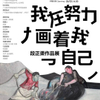
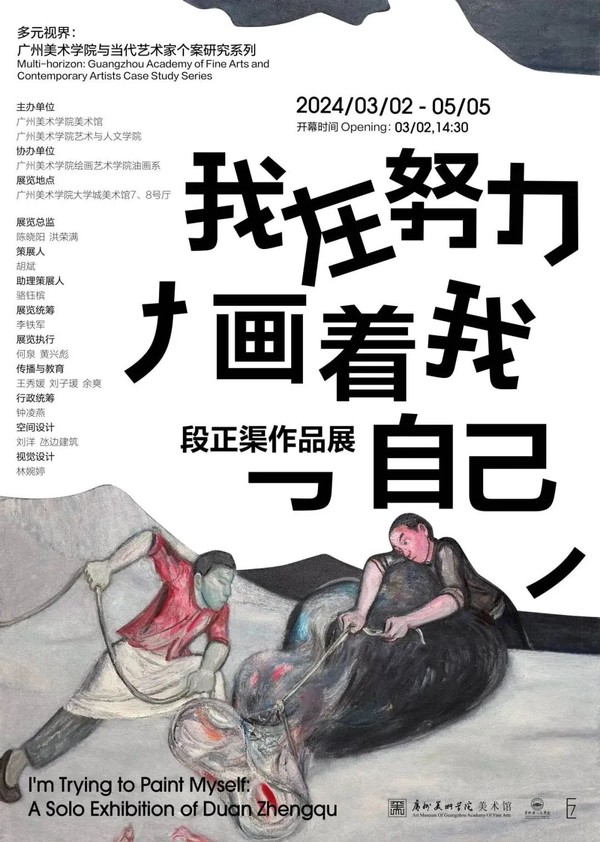
多元视界:广州美术学院与当代艺术家个案研究系列
Multi-horizon: Guangzhou Academy of Fine Arts and Contemporary Artists Case Study Series
我在努力画着我自己:段正渠作品展
I'm Trying to Paint Myself: A Solo Exhibition of Duan Zhengqu
主办单位:广州美术学院美术馆、广州美术学院艺术与人文学院
协办单位:广州美术学院绘画艺术学院油画系
开幕时间:2024年3月2日14:30
展览时间:2024年3月2日—5月5日
展览地点:广州美术学院大学城美术馆7、8号厅(广州市番禺区大学城外环西路168号)
展览总监:陈晓阳、洪荣满
策展人:胡斌助理
策展人:骆钰槟
展览统筹: 李铁军
展览执行:黄兴彪、何泉传播与教育:王秀媛、刘子瑗、余爽
行政统筹: 钟凌燕空间设计:刘洋、氹边
建筑视觉设计:林婉婷
Host: Art Museum of Guangzhou Academy of Fine Arts, School of Arts and Humanities, Guangzhou Academy of Fine ArtsCo-organizer: Oil Painting Department of School of Painting and Drawing of Guangzhou Academy of Fine ArtsOpening: 14:30, March 2nd, 2024Duration: March 2nd to May 5th, 2024Venue: Exhibition Hall 7 and Hall 8, Art Museum of Guangzhou Academy of Fine Arts, University Town, Panyu DistrictArtistic Director: Chen Xiaoyang, Hong RongmanCurator: Hu BinAssistant Curator: Luo YubinExhibition Coordination: Li TiejunExhibition Executive: Huang Xingbiao, He Quan Public Programme: Wang Xiuyuan, Liu Ziyuan, Yu ShuangAdministrative Coordination: Zhong LingyanSpace Design: Liu Yang, Atelier WatersideVisual Design: Lin Wanting
前言 Preface
改革开放之初在广州美术学院求学的段正渠毕业后回到家乡河南,并以厚拙的造型和极富视觉张力、有如北方泥土中生长出来的风格而于艺坛确立别具一格的形象。此后,段正渠在“北方”这一主题上有不同向度的深化和拓展,而且,这种拓展与其身体的行迹和体悟是联系在一起的。近些年来,他更是力图突破既有的题材和语言范围,在一种渐进式的延展之中进行多种尝试。 “北方”是谈到段正渠时最具标签式的界定。但是,他专注和表达的“北方”却并不是他的家乡,而是不同的“异地”。正如一开始,他既没有选择求学之地“花红柳绿”的珠三角,也没有选择“太过熟近”的家乡河南,而是一头扎进了陕北。陕北民居、山川以及有关民谣、船夫等的日常生活成为其主要表达的对象。而与此同时所建立的是糅合了西方新表现主义和中国传统资源的具有自身独特意趣的“魔幻现实主义”,将现实与想象、日常与夸张交织在一起,叙说着某种带有本土文化根性的故事与传说。黄河、鲤鱼、船夫、灯火等意象是他反复表现的母题,并经常笼罩在沉郁的“暮色”之中,透示出强烈的神秘主义气息和苍茫幽深的基调。之后,内蒙古、甘肃、新疆以及近些年常去的山西右卫,也成为他写生创作线路图中的“据点”,甚至还包括部分国外的旅行写生。但总体来说,中国的西北是他涉猎最多的区域。正如段正渠所言,这些区域历史人文比较厚重、遗迹比较多,而心系北方或许与其幼年经历和性格有关。这种个体的文化品性似乎又幻化为某种集体的文化形象而给观者留下烙印。 南方,北方,不同的地理感知联动的是迥然相异的文化体感。从上世纪80年代所谓“萨特与邓丽君”交叠弥漫的氛围到千帆过尽、全球化的激荡已成日常的今天,我们基于珠三角的地理和人文环境重思“北方”,无疑又具有另一重值得深思的意涵。 与国内的很多艺术家一样,段正渠的艺术历程和美术学院有着密切的关联。1983年毕业于广州美术学院油画系之后曾在群众艺术馆、画院工作,1999年调入首都师范大学美术学院任教,而1991年引起艺术圈关注的“二段”(段正渠、段建伟)展也是选择在中央美术学院画廊举办。学院与中国当代艺术的关系是近些年反复被谈及的话题。原本被视为二元对立的关系也因为时代情境的更迭以及观察视角的改变而生发出更为立体复杂的维度。置身于学院、画院等体制内的环境,并且很长时间所参加的多为官方体制的展览,段正渠所衍生的艺术与教学该如何被真实地安置? 在当下的学院机制中,所谓主旋律艺术和当代艺术均成为制度化的安排。曾经在学院高度卷入对抗性的前卫浪潮时保持审慎的距离,而在全球化、资本化的致密系统中又求诸自身的段正渠,仿若“老手艺人”般一如既往根植于脚下的土地,日复一日、年复一年地写生、创作。这样的写生和创作于学院而言是再熟悉不过的“课程”和“考察”,然而,这里面或许蕴含着另一种绘画的动力机制。它不同于一般的写生训练和素材搜集,也不同于目前当代艺术世界兴起的各种地缘“行走”。对于艺术家而言,它也许是一种躬身自问和引发绘画动力的“楔子”。而且越往后,段正渠的作品已经愈加脱离对于眼前所见的描绘,而更多地将具身性的体验化作推动绘画新变的契机。 在反映都市周遭生活成为当代艺术某种倾向时,他的粗犷浓烈的黄土味得以反向凸显;而在清理符号化、图式化的当代艺术情境中,他那曾经并不被视作“前沿”的行为再次被突出审视。然而,他又一次试图从中剥离出来,消解浓郁的乡村意味,基调也变得散淡平和。段正渠不断琢磨着、坚持着、变化着,追寻着那奇特的生命力。诚如所言:“我在努力画着我自己”,这样的艺术进路之于我们当下的绘画讨论无疑能够给予某种启发。
策展人:胡斌
Duan Zhengqu, who studied at the Guangzhou Academy of Fine Arts at the beginning of the reform and opening up, returned to his home province of Henan after graduation, and established a unique image in the art world with his thick and unsophisticated shape and a style that is rich in visual tension, like that grown in the soil of the north. Since then, Duan Zhengqu has deepened and expanded in different directions on the theme of "North", and this expansion is connected with his physical trace and understanding. In recent years, he is trying to break through the existing subject and language range, and has made many attempts in a kind of progressive extension. "North" is the most labeling definition when it comes to Duan Zhengqu. However, the "north" he focused on and expressed was not his hometown, but a various of "different places". Just as at the beginning, he did not choose the fancy Pearl River Delta where he studied, nor did he choose his hometown of Henan where he was "too familiar", but plunged into northern Shaanxi. The folk houses, mountains and rivers, the daily life of folk songs and boatmen in northern Shaanxi are the main objects of his expression. At the same time, what he established was the "magic realism" with its own unique interest, which combined Western neo-expressionism and traditional Chinese resources, weaving reality and imagination, daily life and exaggeration together, telling some stories and legends with local cultural roots. The Yellow River, carp, boatman, lights and other images are his repeated motifs, and are often enveloped in the gloomy "twilight", revealing a strong mystic atmosphere and a boundless and profound tone. After that, Inner Mongolia, Gansu, Xinjiang and Youwei town of Shanxi which he often visited in recent years, also became the "strongholds" in his sketch creation roadmap, and even included some foreign travel sketches. But in general, northwest China is his most covered area. As Duan Zhengqu said, these regions are relatively heavy in history and culture, and there are more relics, and his attachment to the north may be related to his childhood experience and personality. This kind of individual cultural character seems to be transformed into a collective cultural image and leave a mark on the audience. The different geographical perception of the south and the north is linked to the very different cultural perception. From the so-called "Sartre and Teresa Teng" overlap diffuse atmosphere in the 1980s to the end of thousand sails, the agitation of globalization has become a daily today, we rethink "north" based on the geographical and cultural environment of the Pearl River Delta, which undoubtedly has another significance worth pondering. Like many artists in China, Duan Zhengqu's artistic history is closely related to the academy of fine arts. After graduating from the Oil Painting Department of Guangzhou Academy of Fine Arts in 1983, he worked in the mass art museum and the painting academy. In 1999, he was transferred to the College of Fine Arts of Capital Normal University to teach, in 1991, the exhibition of "Dual Duan" (Duan Zhengqu and Duan Jianwei) that attracted the attention of the art circle was held in the gallery of Central Academy of Fine Arts. The relationship between the academy and Chinese contemporary art is a topic that has been talked about repeatedly in recent years. The relationship that was originally regarded as binary opposites also gives rise to more three-dimensional and complex dimensions due to the change of the situation of the times and the change of observation perspective. In the environment of the academy, the painting academy and other institutions, and most of the exhibitions he has participated in for a long time are official system exhibitions, how should the art and teaching derived from Duan Zhengqu be truly placed? In the current academy mechanism, the so-called main melody art and contemporary art have become institutionalized arrangements. Duan Zhengqu kept a prudent distance when the Academy was highly involved in the confrontational avant-garde wave, and appealed to himself in the dense system of globalization and capitalization, like an "old craftsman" as always rooted in the ground beneath his feet, sketching and creating day after day and year after year. Such sketching and creation is a familiar "course" and "investigation" for the academy, however, there may be another dynamic mechanism of painting. It is different from the general sketching training and material collection, and also different from the various geographical "walks" emerging in the current contemporary art world. For the artist, it may be a kind of self-reflection and the "wedge" to trigger the motivation of painting. And the more later, Duan Zhengqu's works have become more detached from the depiction of what is seen, and more and more turned the embodied experience into an opportunity to promote the new change of painting. When reflecting the urban life becomes a certain trend of contemporary art, his rough and strong loess flavor is highlighted in a reversed way; In the context of clearing up symbolized and schematized contemporary art situation, his behavior that was not once regarded as "frontier" has been highlighted again. However, he once again tried to separate from it, to dissolve the strong rural connotation, and the tone became relaxed and peaceful. Duan Zhengqu constantly pondering, insisting, changing, pursuing the strange vitality. As the saying goes: "I’m trying to paint myself", such an artistic approach can undoubtedly give some inspiration to our current painting discussion.
Curator: Hu Bin
部分展出作品 Selected Exhibits
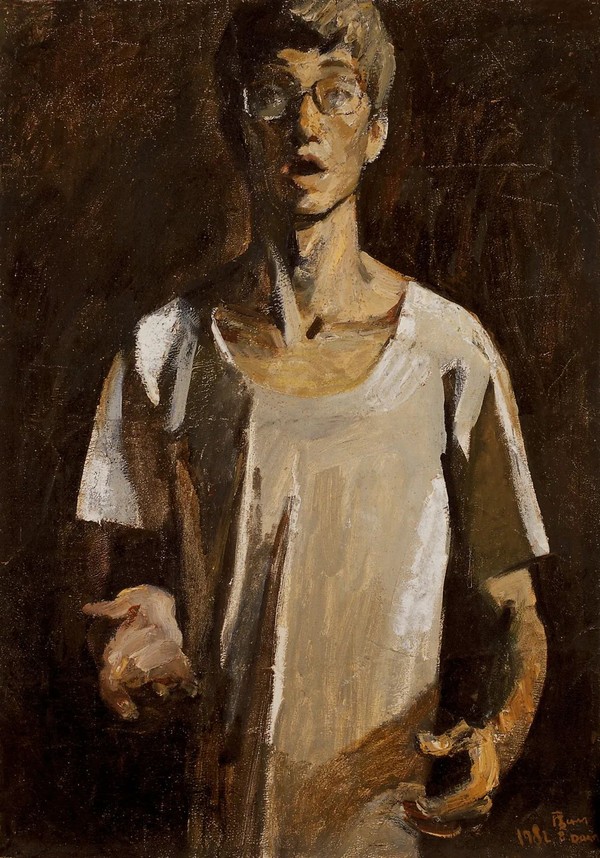
自画像/76X54cm/纸本油画/1982年
Self-portrait, 76×54cm, Oil on paper, 1982
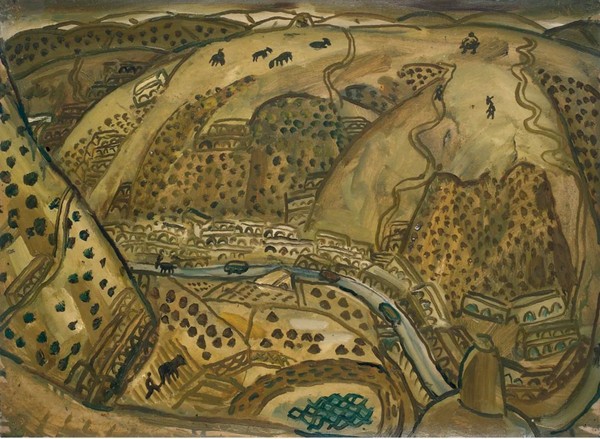
陕北民居/39X54cm/纸本油画/1987年
Folk Houses in Northern Shaanxi, 39×54cm, Oil on paper, 1987
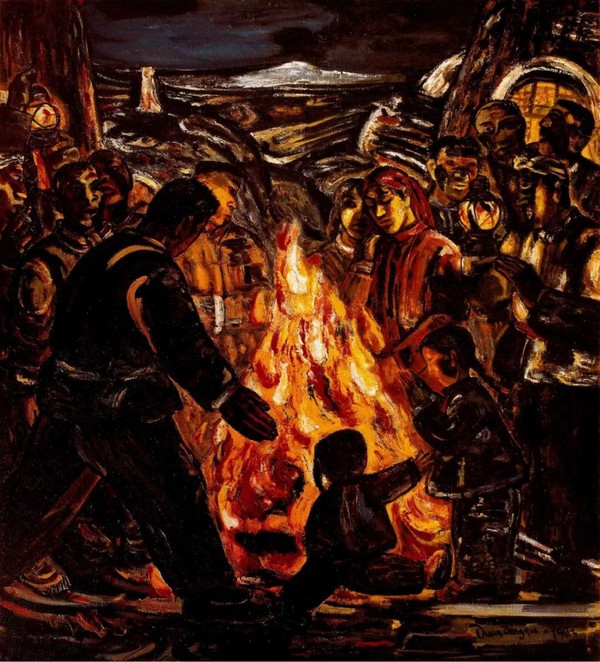
北方之一/170X190cm/布面油画/1994年
North No.1, 170×190cm, Oil on canvas, 1994
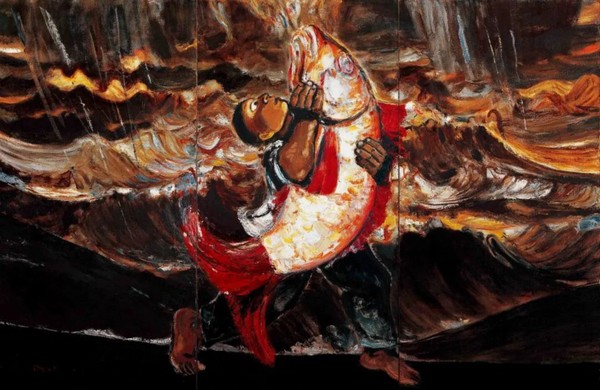
黄河传说/200X300cm/布面油画/2004年
Legend of the Yellow River, 200×300cm, Oil on canvas, 2004
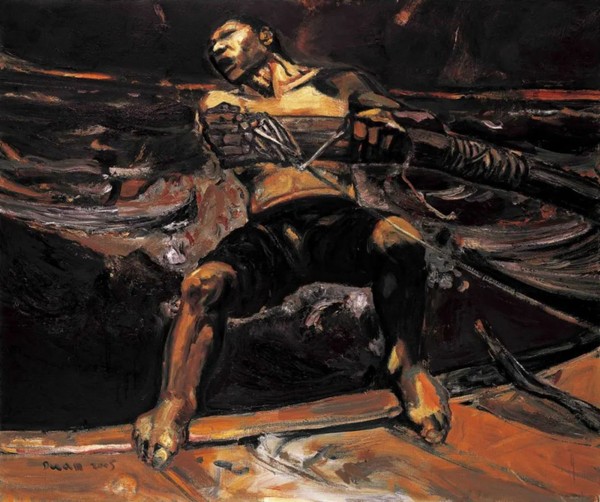
黄河传说之四/150x180cm/布面油画/2005年
Legend of the Yellow River No.4, 150×180cm, Oil on canvas, 2005
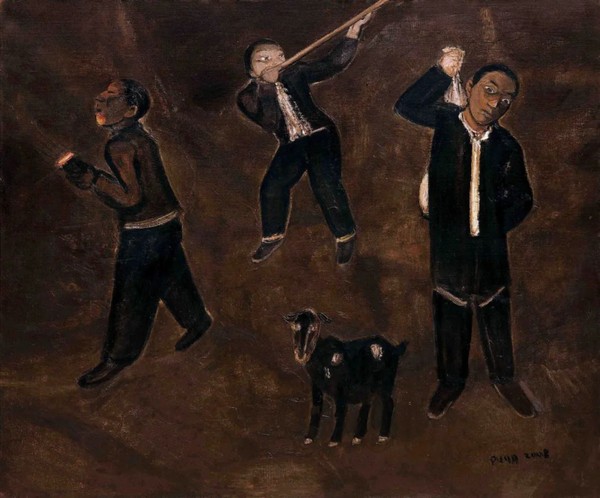
麻黄梁之夜/50x180cm/布面油画/2008年
Night in Mahuangliang, 50×180cm, Oil on canvas, 2008
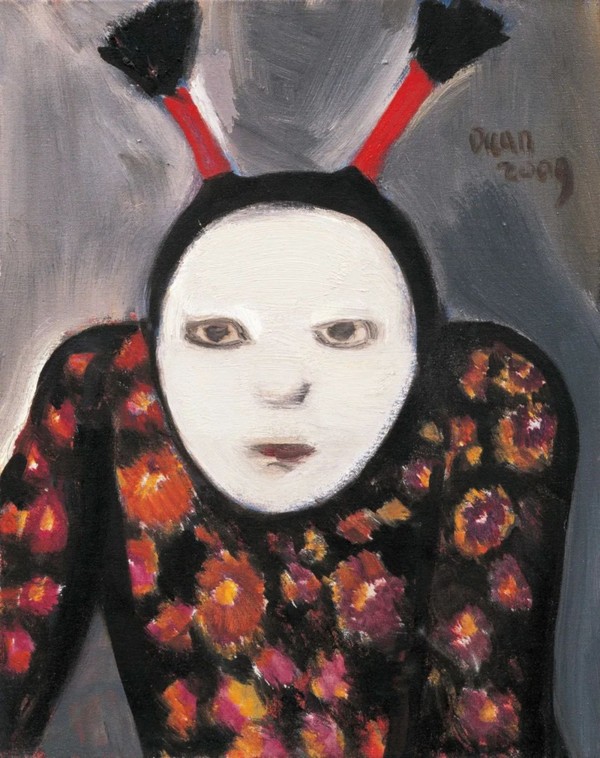
化了妆的横山人组画二/50x40cm/布面油画/2009年
Hengshan People Wearing Makeup Series No.2, 50×40cm, Oil on canvas, 2009午
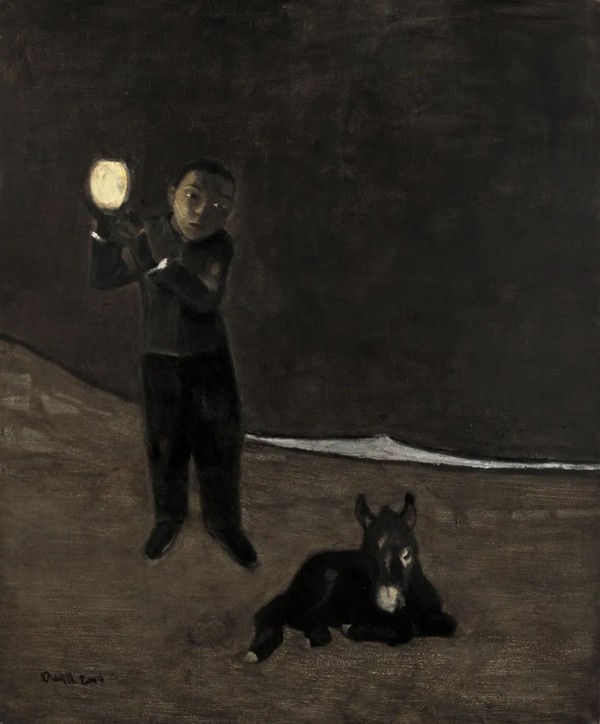
夜/180x150cm/布面油画/2009年
Midnight, 180×150cm, Oil on canvas, 2009
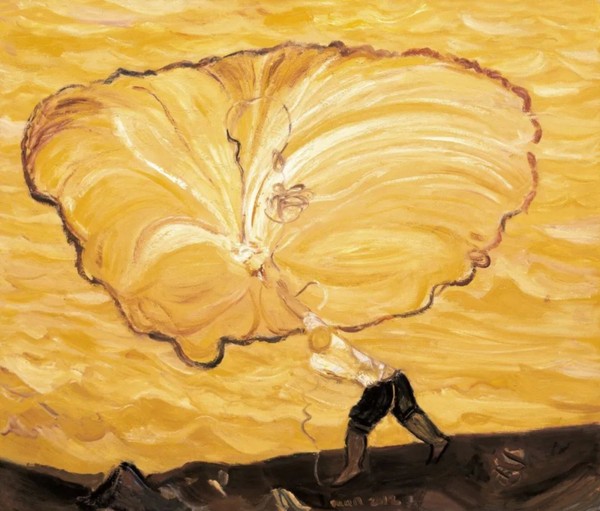
撒网/150X180cm/布面油画/2012年
Casting a Net, 150×180cm, Oil on canvas, 2012
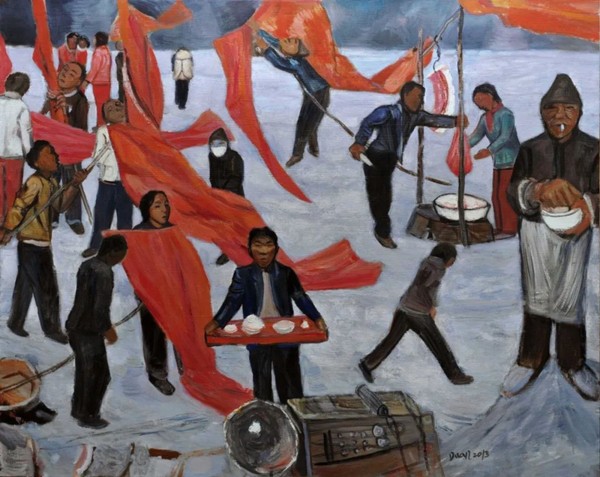
乡村节日/160X200cm/布面油画/2013年
Rural Festival, 160×200cm, Oil on canvas, 2013
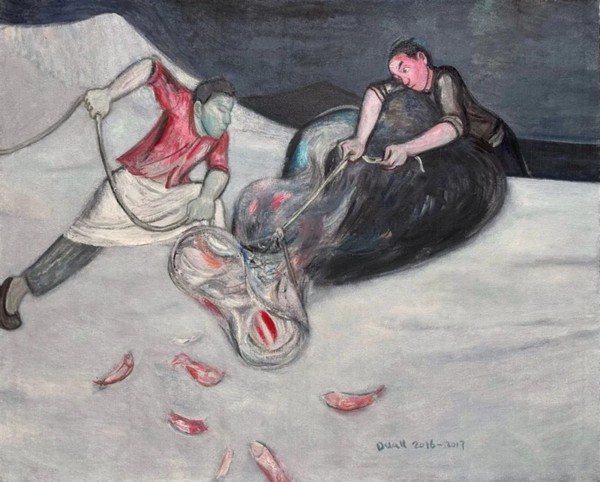
捕获/130X60cm/布面油画/2016年
Capture, 130×60cm, Oil on canvas, 2016
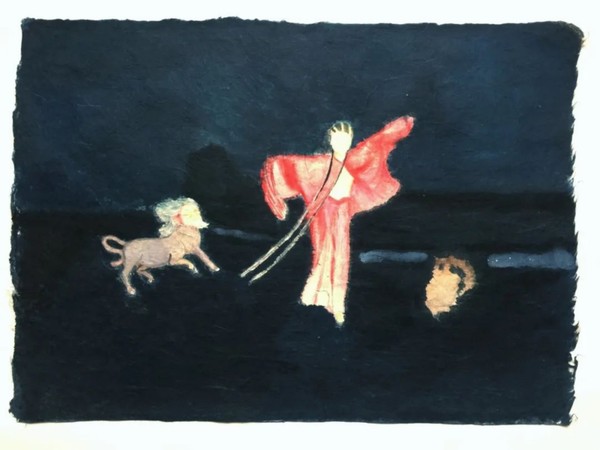
镇北台/40X55cm/皮纸水彩/2016年
Zhenbeitai, 40×55cm, Watercolor on leather and paper, 2016
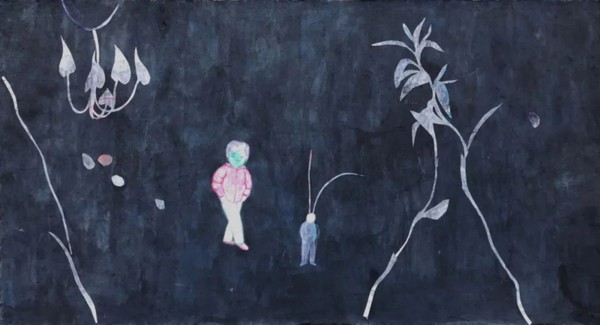
葭州/100X80cm/皮纸水彩/2018年
Jiazhou, 100×80cm, Watercolor on leather and paper, 2018
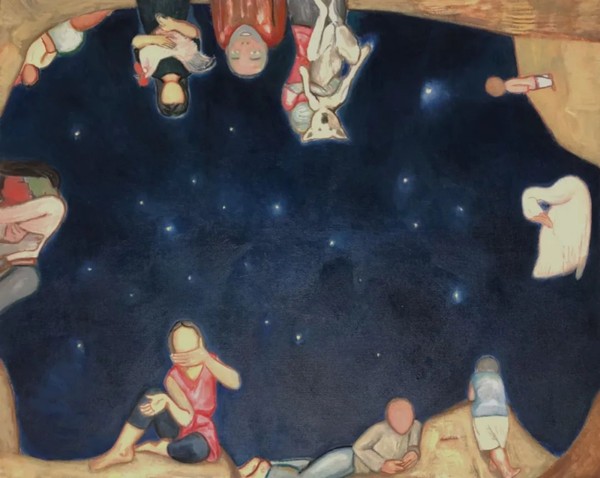
寓言/130X60cm/布面油画/2020年
Fable, 130×60cm, Oil on canvas, 2020

黄昏/110X130cm/布面油画/2022年
Nightfall, 110×130cm, Oil on canvas, 2022
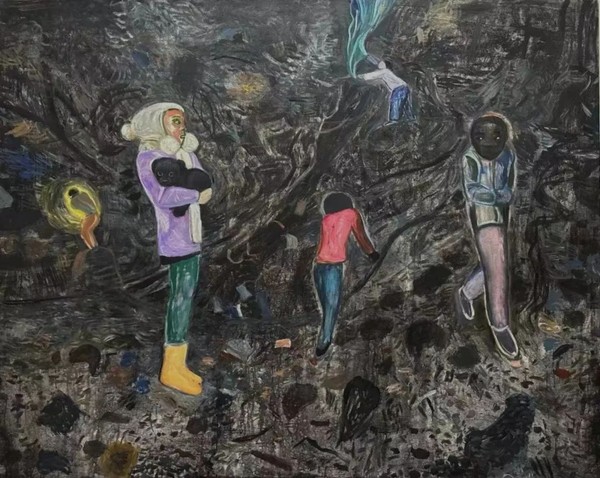
右卫/布面油画/160×200cm/2022年
Youwei, 160×200cm, Oil on canvas, 2022
关于艺术家 About the Artist
段正渠,1958年生于河南偃师,1983年毕业于广州美术学院油画系。现为首都师范大学美术学院教授与博士研究生导师,中国国家画院油画院研究员,中国美术家协会油画艺委会委员和中国油画学会理事。 段正渠曾多次参加在中国美术馆举行的大型展览,也曾在中央美术学院画廊、香港大学博物馆、南京艺术学院美术馆、日本国立国际美术馆、北京国际艺苑美术馆、韩国国立现代美术馆、韩国首尔市立美术馆、芬兰瓦萨美术馆、秘鲁利马国家博物馆、智利现代艺术博物馆、湖北美术学院美术馆、新疆乌鲁木齐市美术馆、台北市立美术馆、俄罗斯国立博物馆、北京大学展览馆、浙江美术馆、上海美术馆、广东美术馆、福建美术馆、OCAT深圳、何香凝美术馆、中央美术学院美术馆等国内外艺术机构展出过作品。他曾在北京画院美术馆、中国油画院美术馆等机构举办个展,也是2000年上海双年展、2003年首届、2005年第二届与2015年第六届北京国际美术双年展,以及2018年第二届银川双年展的参展艺术家。 他有多本个人作品选出版,其中包括《段正渠作品选》《当代油画家自选集·段正渠油画作品选》(天津人民美术出版社,1996年),《中国现代艺术品评丛书·段正渠》(广西美术出版社,1998年),《陕北听歌》(辽宁美术出版社,1999年),《段正渠》(上海文艺出版社,2005年),《纸上——段正渠纸本作品》(河南美术出版社,2007年),《二段——段正渠》(吉林美术出版社,2007年),《段正渠——乡村风景》(吉林美术出版社,2009年),《学院美术30年——段正渠》(山东美术出版社,2010年),《故事和传说——段正渠艺术30年》(湖南美术出版社,2012年),《首都师范大学美术学院现代绘画书系——段正渠》(2013年),《1981——2015段正渠纸上作品集上、下》(河北美术出版社,2015年),以及《花园村艺话——段正渠》(四川美术出版社,2016年),《西行列车》(广西师大出版社,2023年),《右卫/段正渠新作2018-2023》(河南美术出版社,2023年)等。
Duan Zhengqu (b.1958, Yanshi, Henan Province) graduated in the Oil Painting Department of Guangzhou Academy of Fine Arts in 1983. He is currently a professor and PhD supervisor at the Faculty of Fine Arts in Capital Normal University; researcher of the Oil Painting Institute of China National Painting Academy; a member of the Oil Painting Art Committee of China Artists Association, and director of China Oil Painting Society.
Duan Zhengqu has participated in many large-scale exhibitions organized at the National Art Museum of China. He has also exhibited previously at the Gallery of Central Academy of Fine Arts; Hong Kong University Museum; Art Museum of Nanjing University of the Arts; Beijing International Art Gallery; Peking University Exhibition Hall; Zhejiang Art Museum; Shanghai Art Museum; Guangdong Museum of Art; Fujian Art Museum, OCAT Shenzhen; He Xiangning Art Museum; Art Museum of Hubei Academy of Fine Arts; Xinjiang Art Museum, Urumqi; Taipei Fine Arts Museum; The National Museum of Art, Osaka; National Museum of Modern and Contemporary Art, Seoul; Seoul City of Museum of Art; Vasa Art Museum of Finland; National Museum of Lima; Museum of Modern Art of Chile and Russian National Museum, etc. He has also held solo exhibitions at the Art Museum of Beijing Fine Art Academy and the China Oil Painting Institute Art Museum. Other notable exhibitions include the Shanghai Biennale in 2000; Beijing International Art Biennale (2003, 2005 and 2015); as well as the second edition of Yinchuan Biennale in 2018.
Many of his works have also been selected for publications, including Selected Works of Duan Zhengqu; Selected Works of Contemporary Oil Painters and Works of Duan Zhengqu, Tianjin People's Fine Arts Publishing House, 1996; China Modern Art Review Series: Duan Zhenqu, Guangxi Fine Arts Publishing House, 1998; Shaanbei Listening Song, Liaoning Fine Arts Publishing House, 1999; Duan Zhengqu, Shanghai Literary and Art Publishing House, 2005; On Paper - Duan Zhengqu Paper Works, Henan Fine Arts Publishing House, 2007; Dual Duan: Duan Zhengqu, Jilin Fine Arts Publishing House, 2007; Duan Zhengqu: Village Landscape, Jilin Fine Arts Publishing House, 2009; Academy Art 30 Years: Duan Zhengqu, Shandong Fine Arts Publishing House, 2010; Stories and Legends: Duan Zhengqu, Art After 30 Years, Hunan Fine Arts Publishing House, 2012; Modern Painting and the Painting Department of Capital Normal University, Duan Zhengqu, Capital Normal University Press, 2013; 1981-2015 Anthology of Works, Hebei Art Press, 2015; Garden Village Art: Duan Zhengqu, Sichuan Fine Arts Publishing House, 2016; Westbound Train, Guangxi Normal University Press, 2023; and Youwei/New Works of Duan Zhengqu 2018-2023, Henan Fine Arts Publishing House, 2023.
转自:广州美术学院大学城美术馆
展览预告 | 我在努力画着我自己:段正渠作品展
多元视界:广州美术学院与当代艺术家个案研究系列
Multi-horizon: Guangzhou Academy of Fine Arts and Contemporary Artists Case Study Series
我在努力画着我自己:段正渠作品展I'm Trying to Paint Myself: A Solo Exhibition of Duan Zhengqu主办单位:广州美术学院美术馆、广州美术学院艺术与人文学院协办单位:广州美术学院绘画艺术学院油画系开幕时间:2024年3月2日14:30展览时间:2024年3月2日—5月5日展览地点:广州美术学院大学城美术馆7、8号厅(广州市番禺区大学城外环西路168号)展览总监:陈晓阳、洪荣满策展人:胡斌助理策展人:骆钰槟展览统筹: 李铁军展览执行:黄兴彪、何泉传播与教育:王秀媛、刘子瑗、余爽行政统筹: 钟凌燕空间设计:刘洋、氹边建筑视觉设计:林婉婷Host: Art Museum of Guangzhou Academy of Fine Arts, School of Arts and Humanities, Guangzhou Academy of Fine ArtsCo-organizer: Oil Painting Department of School of Painting and Drawing of Guangzhou Academy of Fine ArtsOpening: 14:30, March 2nd, 2024Duration: March 2nd to May 5th, 2024Venue: Exhibition Hall 7 and Hall 8, Art Museum of Guangzhou Academy of Fine Arts, University Town, Panyu DistrictArtistic Director: Chen Xiaoyang, Hong RongmanCurator: Hu BinAssistant Curator: Luo YubinExhibition Coordination: Li TiejunExhibition Executive: Huang Xingbiao, He Quan Public Programme: Wang Xiuyuan, Liu Ziyuan, Yu ShuangAdministrative Coordination: Zhong LingyanSpace Design: Liu Yang, Atelier WatersideVisual Design: Lin Wanting
前言 Preface
改革开放之初在广州美术学院求学的段正渠毕业后回到家乡河南,并以厚拙的造型和极富视觉张力、有如北方泥土中生长出来的风格而于艺坛确立别具一格的形象。此后,段正渠在“北方”这一主题上有不同向度的深化和拓展,而且,这种拓展与其身体的行迹和体悟是联系在一起的。近些年来,他更是力图突破既有的题材和语言范围,在一种渐进式的延展之中进行多种尝试。 “北方”是谈到段正渠时最具标签式的界定。但是,他专注和表达的“北方”却并不是他的家乡,而是不同的“异地”。正如一开始,他既没有选择求学之地“花红柳绿”的珠三角,也没有选择“太过熟近”的家乡河南,而是一头扎进了陕北。陕北民居、山川以及有关民谣、船夫等的日常生活成为其主要表达的对象。而与此同时所建立的是糅合了西方新表现主义和中国传统资源的具有自身独特意趣的“魔幻现实主义”,将现实与想象、日常与夸张交织在一起,叙说着某种带有本土文化根性的故事与传说。黄河、鲤鱼、船夫、灯火等意象是他反复表现的母题,并经常笼罩在沉郁的“暮色”之中,透示出强烈的神秘主义气息和苍茫幽深的基调。之后,内蒙古、甘肃、新疆以及近些年常去的山西右卫,也成为他写生创作线路图中的“据点”,甚至还包括部分国外的旅行写生。但总体来说,中国的西北是他涉猎最多的区域。正如段正渠所言,这些区域历史人文比较厚重、遗迹比较多,而心系北方或许与其幼年经历和性格有关。这种个体的文化品性似乎又幻化为某种集体的文化形象而给观者留下烙印。 南方,北方,不同的地理感知联动的是迥然相异的文化体感。从上世纪80年代所谓“萨特与邓丽君”交叠弥漫的氛围到千帆过尽、全球化的激荡已成日常的今天,我们基于珠三角的地理和人文环境重思“北方”,无疑又具有另一重值得深思的意涵。 与国内的很多艺术家一样,段正渠的艺术历程和美术学院有着密切的关联。1983年毕业于广州美术学院油画系之后曾在群众艺术馆、画院工作,1999年调入首都师范大学美术学院任教,而1991年引起艺术圈关注的“二段”(段正渠、段建伟)展也是选择在中央美术学院画廊举办。学院与中国当代艺术的关系是近些年反复被谈及的话题。原本被视为二元对立的关系也因为时代情境的更迭以及观察视角的改变而生发出更为立体复杂的维度。置身于学院、画院等体制内的环境,并且很长时间所参加的多为官方体制的展览,段正渠所衍生的艺术与教学该如何被真实地安置? 在当下的学院机制中,所谓主旋律艺术和当代艺术均成为制度化的安排。曾经在学院高度卷入对抗性的前卫浪潮时保持审慎的距离,而在全球化、资本化的致密系统中又求诸自身的段正渠,仿若“老手艺人”般一如既往根植于脚下的土地,日复一日、年复一年地写生、创作。这样的写生和创作于学院而言是再熟悉不过的“课程”和“考察”,然而,这里面或许蕴含着另一种绘画的动力机制。它不同于一般的写生训练和素材搜集,也不同于目前当代艺术世界兴起的各种地缘“行走”。对于艺术家而言,它也许是一种躬身自问和引发绘画动力的“楔子”。而且越往后,段正渠的作品已经愈加脱离对于眼前所见的描绘,而更多地将具身性的体验化作推动绘画新变的契机。 在反映都市周遭生活成为当代艺术某种倾向时,他的粗犷浓烈的黄土味得以反向凸显;而在清理符号化、图式化的当代艺术情境中,他那曾经并不被视作“前沿”的行为再次被突出审视。然而,他又一次试图从中剥离出来,消解浓郁的乡村意味,基调也变得散淡平和。段正渠不断琢磨着、坚持着、变化着,追寻着那奇特的生命力。诚如所言:“我在努力画着我自己”,这样的艺术进路之于我们当下的绘画讨论无疑能够给予某种启发。策展人:胡斌
Duan Zhengqu, who studied at the Guangzhou Academy of Fine Arts at the beginning of the reform and opening up, returned to his home province of Henan after graduation, and established a unique image in the art world with his thick and unsophisticated shape and a style that is rich in visual tension, like that grown in the soil of the north. Since then, Duan Zhengqu has deepened and expanded in different directions on the theme of "North", and this expansion is connected with his physical trace and understanding. In recent years, he is trying to break through the existing subject and language range, and has made many attempts in a kind of progressive extension. "North" is the most labeling definition when it comes to Duan Zhengqu. However, the "north" he focused on and expressed was not his hometown, but a various of "different places". Just as at the beginning, he did not choose the fancy Pearl River Delta where he studied, nor did he choose his hometown of Henan where he was "too familiar", but plunged into northern Shaanxi. The folk houses, mountains and rivers, the daily life of folk songs and boatmen in northern Shaanxi are the main objects of his expression. At the same time, what he established was the "magic realism" with its own unique interest, which combined Western neo-expressionism and traditional Chinese resources, weaving reality and imagination, daily life and exaggeration together, telling some stories and legends with local cultural roots. The Yellow River, carp, boatman, lights and other images are his repeated motifs, and are often enveloped in the gloomy "twilight", revealing a strong mystic atmosphere and a boundless and profound tone. After that, Inner Mongolia, Gansu, Xinjiang and Youwei town of Shanxi which he often visited in recent years, also became the "strongholds" in his sketch creation roadmap, and even included some foreign travel sketches. But in general, northwest China is his most covered area. As Duan Zhengqu said, these regions are relatively heavy in history and culture, and there are more relics, and his attachment to the north may be related to his childhood experience and personality. This kind of individual cultural character seems to be transformed into a collective cultural image and leave a mark on the audience. The different geographical perception of the south and the north is linked to the very different cultural perception. From the so-called "Sartre and Teresa Teng" overlap diffuse atmosphere in the 1980s to the end of thousand sails, the agitation of globalization has become a daily today, we rethink "north" based on the geographical and cultural environment of the Pearl River Delta, which undoubtedly has another significance worth pondering. Like many artists in China, Duan Zhengqu's artistic history is closely related to the academy of fine arts. After graduating from the Oil Painting Department of Guangzhou Academy of Fine Arts in 1983, he worked in the mass art museum and the painting academy. In 1999, he was transferred to the College of Fine Arts of Capital Normal University to teach, in 1991, the exhibition of "Dual Duan" (Duan Zhengqu and Duan Jianwei) that attracted the attention of the art circle was held in the gallery of Central Academy of Fine Arts. The relationship between the academy and Chinese contemporary art is a topic that has been talked about repeatedly in recent years. The relationship that was originally regarded as binary opposites also gives rise to more three-dimensional and complex dimensions due to the change of the situation of the times and the change of observation perspective. In the environment of the academy, the painting academy and other institutions, and most of the exhibitions he has participated in for a long time are official system exhibitions, how should the art and teaching derived from Duan Zhengqu be truly placed? In the current academy mechanism, the so-called main melody art and contemporary art have become institutionalized arrangements. Duan Zhengqu kept a prudent distance when the Academy was highly involved in the confrontational avant-garde wave, and appealed to himself in the dense system of globalization and capitalization, like an "old craftsman" as always rooted in the ground beneath his feet, sketching and creating day after day and year after year. Such sketching and creation is a familiar "course" and "investigation" for the academy, however, there may be another dynamic mechanism of painting. It is different from the general sketching training and material collection, and also different from the various geographical "walks" emerging in the current contemporary art world. For the artist, it may be a kind of self-reflection and the "wedge" to trigger the motivation of painting. And the more later, Duan Zhengqu's works have become more detached from the depiction of what is seen, and more and more turned the embodied experience into an opportunity to promote the new change of painting. When reflecting the urban life becomes a certain trend of contemporary art, his rough and strong loess flavor is highlighted in a reversed way; In the context of clearing up symbolized and schematized contemporary art situation, his behavior that was not once regarded as "frontier" has been highlighted again. However, he once again tried to separate from it, to dissolve the strong rural connotation, and the tone became relaxed and peaceful. Duan Zhengqu constantly pondering, insisting, changing, pursuing the strange vitality. As the saying goes: "I’m trying to paint myself", such an artistic approach can undoubtedly give some inspiration to our current painting discussion.Curator: Hu Bin
部分展出作品 Selected Exhibits
自画像/76X54cm/纸本油画/1982年Self-portrait, 76×54cm, Oil on paper, 1982陕北民居/39X54cm/纸本油画/1987年Folk Houses in Northern Shaanxi, 39×54cm, Oil on paper, 1987北方之一/170X190cm/布面油画/1994年North No.1, 170×190cm, Oil on canvas, 1994黄河传说/200X300cm/布面油画/2004年Legend of the Yellow River, 200×300cm, Oil on canvas, 2004黄河传说之四/150x180cm/布面油画/2005年Legend of the Yellow River No.4, 150×180cm, Oil on canvas, 2005麻黄梁之夜/50x180cm/布面油画/2008年Night in Mahuangliang, 50×180cm, Oil on canvas, 2008化了妆的横山人组画二/50x40cm/布面油画/2009年Hengshan People Wearing Makeup Series No.2, 50×40cm, Oil on canvas, 2009午夜/180x150cm/布面油画/2009年Midnight, 180×150cm, Oil on canvas, 2009撒网/150X180cm/布面油画/2012年Casting a Net, 150×180cm, Oil on canvas, 2012乡村节日/160X200cm/布面油画/2013年Rural Festival, 160×200cm, Oil on canvas, 2013捕获/130X60cm/布面油画/2016年Capture, 130×60cm, Oil on canvas, 2016镇北台/40X55cm/皮纸水彩/2016年Zhenbeitai, 40×55cm, Watercolor on leather and paper, 2016葭州/100X80cm/皮纸水彩/2018年Jiazhou, 100×80cm, Watercolor on leather and paper, 2018寓言/130X60cm/布面油画/2020年Fable, 130×60cm, Oil on canvas, 2020黄昏/110X130cm/布面油画/2022年Nightfall, 110×130cm, Oil on canvas, 2022右卫/布面油画/160×200cm/2022年Youwei, 160×200cm, Oil on canvas, 2022
关于艺术家 About the Artist
段正渠,1958年生于河南偃师,1983年毕业于广州美术学院油画系。现为首都师范大学美术学院教授与博士研究生导师,中国国家画院油画院研究员,中国美术家协会油画艺委会委员和中国油画学会理事。 段正渠曾多次参加在中国美术馆举行的大型展览,也曾在中央美术学院画廊、香港大学博物馆、南京艺术学院美术馆、日本国立国际美术馆、北京国际艺苑美术馆、韩国国立现代美术馆、韩国首尔市立美术馆、芬兰瓦萨美术馆、秘鲁利马国家博物馆、智利现代艺术博物馆、湖北美术学院美术馆、新疆乌鲁木齐市美术馆、台北市立美术馆、俄罗斯国立博物馆、北京大学展览馆、浙江美术馆、上海美术馆、广东美术馆、福建美术馆、OCAT深圳、何香凝美术馆、中央美术学院美术馆等国内外艺术机构展出过作品。他曾在北京画院美术馆、中国油画院美术馆等机构举办个展,也是2000年上海双年展、2003年首届、2005年第二届与2015年第六届北京国际美术双年展,以及2018年第二届银川双年展的参展艺术家。 他有多本个人作品选出版,其中包括《段正渠作品选》《当代油画家自选集·段正渠油画作品选》(天津人民美术出版社,1996年),《中国现代艺术品评丛书·段正渠》(广西美术出版社,1998年),《陕北听歌》(辽宁美术出版社,1999年),《段正渠》(上海文艺出版社,2005年),《纸上——段正渠纸本作品》(河南美术出版社,2007年),《二段——段正渠》(吉林美术出版社,2007年),《段正渠——乡村风景》(吉林美术出版社,2009年),《学院美术30年——段正渠》(山东美术出版社,2010年),《故事和传说——段正渠艺术30年》(湖南美术出版社,2012年),《首都师范大学美术学院现代绘画书系——段正渠》(2013年),《1981——2015段正渠纸上作品集上、下》(河北美术出版社,2015年),以及《花园村艺话——段正渠》(四川美术出版社,2016年),《西行列车》(广西师大出版社,2023年),《右卫/段正渠新作2018-2023》(河南美术出版社,2023年)等。
Duan Zhengqu (b.1958, Yanshi, Henan Province) graduated in the Oil Painting Department of Guangzhou Academy of Fine Arts in 1983. He is currently a professor and PhD supervisor at the Faculty of Fine Arts in Capital Normal University; researcher of the Oil Painting Institute of China National Painting Academy; a member of the Oil Painting Art Committee of China Artists Association, and director of China Oil Painting Society.
Duan Zhengqu has participated in many large-scale exhibitions organized at the National Art Museum of China. He has also exhibited previously at the Gallery of Central Academy of Fine Arts; Hong Kong University Museum; Art Museum of Nanjing University of the Arts; Beijing International Art Gallery; Peking University Exhibition Hall; Zhejiang Art Museum; Shanghai Art Museum; Guangdong Museum of Art; Fujian Art Museum, OCAT Shenzhen; He Xiangning Art Museum; Art Museum of Hubei Academy of Fine Arts; Xinjiang Art Museum, Urumqi; Taipei Fine Arts Museum; The National Museum of Art, Osaka; National Museum of Modern and Contemporary Art, Seoul; Seoul City of Museum of Art; Vasa Art Museum of Finland; National Museum of Lima; Museum of Modern Art of Chile and Russian National Museum, etc. He has also held solo exhibitions at the Art Museum of Beijing Fine Art Academy and the China Oil Painting Institute Art Museum. Other notable exhibitions include the Shanghai Biennale in 2000; Beijing International Art Biennale (2003, 2005 and 2015); as well as the second edition of Yinchuan Biennale in 2018.
Many of his works have also been selected for publications, including Selected Works of Duan Zhengqu; Selected Works of Contemporary Oil Painters and Works of Duan Zhengqu, Tianjin People's Fine Arts Publishing House, 1996; China Modern Art Review Series: Duan Zhenqu, Guangxi Fine Arts Publishing House, 1998; Shaanbei Listening Song, Liaoning Fine Arts Publishing House, 1999; Duan Zhengqu, Shanghai Literary and Art Publishing House, 2005; On Paper - Duan Zhengqu Paper Works, Henan Fine Arts Publishing House, 2007; Dual Duan: Duan Zhengqu, Jilin Fine Arts Publishing House, 2007; Duan Zhengqu: Village Landscape, Jilin Fine Arts Publishing House, 2009; Academy Art 30 Years: Duan Zhengqu, Shandong Fine Arts Publishing House, 2010; Stories and Legends: Duan Zhengqu, Art After 30 Years, Hunan Fine Arts Publishing House, 2012; Modern Painting and the Painting Department of Capital Normal University, Duan Zhengqu, Capital Normal University Press, 2013; 1981-2015 Anthology of Works, Hebei Art Press, 2015; Garden Village Art: Duan Zhengqu, Sichuan Fine Arts Publishing House, 2016; Westbound Train, Guangxi Normal University Press, 2023; and Youwei/New Works of Duan Zhengqu 2018-2023, Henan Fine Arts Publishing House, 2023.
转自:广州美术学院大学城美术馆

分享到微信,
请点击右上角。
再选择[发送朋友]
或[分享到朋友圈]

